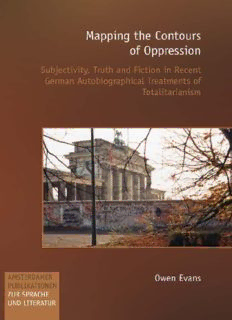
Mapping the Contours of Oppression: Subjectivity, Truth and Fiction in Recent German Autobiographical Treatments of Totalitarianism (Amsterdamer Publikationen zur Sprache und Literatur 156) PDF
Preview Mapping the Contours of Oppression: Subjectivity, Truth and Fiction in Recent German Autobiographical Treatments of Totalitarianism (Amsterdamer Publikationen zur Sprache und Literatur 156)
Mapping the Contours of Oppression Amsterdamer Publikationen zur Sprache und Literatur in Verbindung mit Peter Boerner, Bloomington; Hugo Dyserinck, Aachen; Ferdinand van Ingen, Amsterdam; Friedrich Maurer†, Freiburg; Oskar Reichmann, Heidelberg herausgegeben von Cola Minis† und Arend Quak 156 Mapping the Contours of Oppression Subjectivity, Truth and Fiction in Recent German Autobiographical Treatments of Totalitarianism Owen Evans AAmmsstteerrddaamm -- NNeeww YYoorrkk,, NNYY 22000066 Cover design: Pier Post The paper on which this book is printed meets the requirements of "ISO 9706:1994, Information and documentation - Paper for documents - Requirements for permanence". ISBN: 90-420-1719-8 ©Editions Rodopi B.V., Amsterdam - New York, NY 2006 Printed in The Netherlands For my family and Kate This page intentionally left blank Contents Acknowledgements ix Abbreviations xi Introduction 1 1 ‘Auch ich hatte die Finger im Spiel’: Ludwig Harig, Weh dem, der aus der Reihe tanzt (1990) 19 2 ‘Das Ich liegt immer jenseits der Worte’: Uwe Saeger, Die Nacht danach und der Morgen (1991) 53 3 ‘Für jeden war es einmalig’: Ruth Klüger, weiter leben: Eine Jugend (1992) 95 4 ‘Taktieren mit der Macht’: Günter de Bruyn, Zwischenbilanz: Eine Jugend in Berlin (1992) and Vierzig Jahre: Ein Lebensbericht (1996) 137 5 ‘Die Katalyse des Schreibens’: Günter Kunert, Erwachsenenspiele: Erinnerungen (1997) 181 6 ‘“Man soll nie lügen. Oder nur, wenn es nicht anders geht”’: Christoph Hein, Von allem Anfang an (1997) 231 7 ‘Es gab nur noch die eine Aufgabe: Gegen das Vergessen anzuschreiben’: Grete Weil, Leb ich denn, wenn andere leben(1998) 255 8 ‘Mutmaßungen über Pawel’: Monika Maron, Pawels Briefe: Eine Familiengeschichte (1999) 291 Conclusion 325 Bibliography 329 Index 351 This page intentionally left blank Acknowledgements I should like to record my thanks to the many people and institutions who supported me during my work on this book: first and foremost to Hinrich Siefken and Colin Riordan who both offered invaluable advice and support before, during and after my sabbatical and were, and have remained, so willing to act as referees for me; to the Arts and Humanities Research Board (as was) for awarding me a Research Leave grant that turned one semester of study leave into a two- semester sabbatical; to the British Academy who awarded me a Small Grant to spend a month’s research in Germany during my sabbatical; to staff at the Deutsches Literaturarchiv in Marbach for their support during my stay there; to the University of Wales Bangor for allowing me study leave, and especially to Tony Brown who encouraged me to apply for the AHRB grant in the first place; to my former colleagues in the Modern Languages department in Bangor for indulging me for so long and then letting me go with so many kind words; and to the many cohorts of Bangor students who seemingly never tired of hearing about this project, and especially to those who gave me such a moving send-off in December 2004. I should also like to thank two very important people for their continued, invaluable encouragement: Graeme Harper, for remaining such an inspiration and for pushing me into academic areas I might otherwise have avoided, and finally my wife Kate, who was working flat out on her PhD during my work on this project and yet remained so supportive throughout. This book is dedicated to her and my family. This project would not have been possible without the support of these people. If any errors remain, however, then these are solely my responsibility. Owen Evans University of Wales Swansea November 2005
Description: